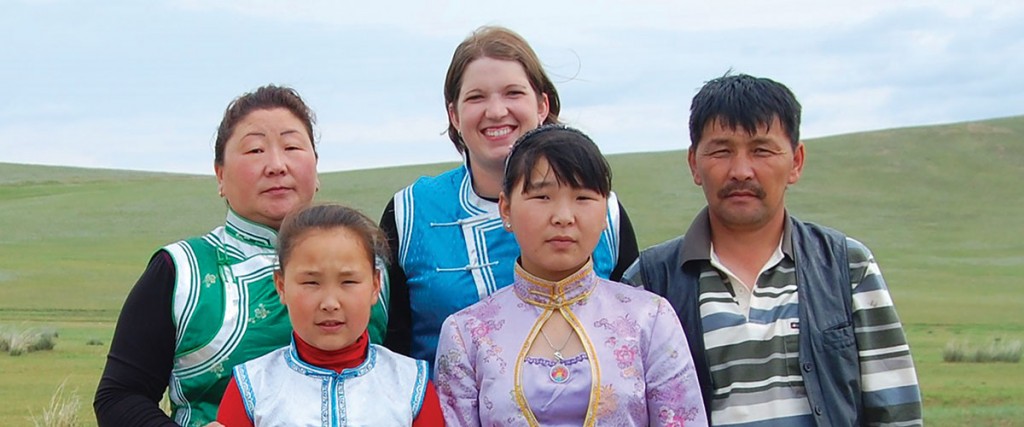Page 20 • (304 results in 0.024 seconds)
-
PLU’s Division of Humanities concludes the 2020-21 school year with relief and gratitude. Dean Kevin O’Brien working from home. Also pictured is Pancake, one of two cats he adopted during the pandemic You can probably imagine the reasons for our relief. This was the third…
syllabi. You’ll read about how students made distance learning work, how faculty continued campus programs, national leadership, and international scholarship. You’ll read how classes were adapted to ensure that students were cared for and supported in English, Languages, Philosophy, Religion, and the MFA. All these stories are honest about the challenges we faced and the real loss of these last years, but they also reveal how much great work continued. As you read about this work, please know that
-

Scholarships make a PLU education possible for many students, and every scholarship has a story. One story begins with Kelmer Roe, an associate professor of Greek and Religion at PLU from 1947 to 1967. In 2004, his relatives Naomi and Don Nothstein and David Roe…
to academic projects. They get excited to work together and excited to share what they learned.”Some projects lead to journal publications, some to books or presentations, others become new courses here and abroad. In 2015-16, English Professor Wendy Call collaborated with Hillary Vo, a writing major, to study the ways places can influence writing and writers. Using Kelmer Roe funds, they spent much of the summer traveling to places like Mt. Rainier and writing about their experiences. This led
-

TACOMA, WASH. (Oct. 6, 2017)- When George and Helen Long reached out to Pacific Lutheran University 10 years ago, all they knew was that they wanted to support the sciences. “George sort of felt like he owed his success and his career to PLU,” said…
had never done anything remotely medical until this internship,” she said. “It’s really more the anatomy, physiology side of it that I really like.”Haley Hurtt '18 Photo by Oliver Johnson '18 This summer, English literature major Haley Hurtt ’18 became well acquainted with her U.S. senators. Or at least their voicemails. Hurtt was an intern for the global poverty nonprofit, The Borgen Project. She was responsible for calling her senators every week and raising at least $500, but her main job was
-

New program preps Lutes for service around the world Pacific Lutheran University’s ties to the Peace Corps are impressive, and they haven’t gone unnoticed. More than 260 Lutes have joined the service organization, which sends trained volunteers around the world to help countries meet their…
a Peace Corps alumna herself. She taught English for two years in Mauritania, a large country on the northwest coast of Africa. Later, Wiley returned for doctoral work. She maintains connections with communities there. “One thing I learned in the Peace Corps was that relationship building and spending time with people was something I was really passionate about,” Wiley said. “And to some extent that is what cultural anthropologists do, we study contemporary human life.” Zylstra stressed that the
-

A native of Yemen, Abdulghani Mosa ‘23 became connected with Palmer Scholars while a sophomore at Foss High School. Pacific Lutheran University and Palmer Scholars have announced they are expanding their partnership to better serve students of color in Pierce County. Mosa shares with us…
. 3. How has Palmer Scholars supported you during the application process to PLU? They helped me to figure out that I am capable of doing anything I put my mind to and work hard at. Palmer scholars believed in me without looking at my GPA or my English level, and judging me, but based on my character. They assisted me in finding my path to success, and the confidence in myself to do anything I put my mind to without hesitation or fear of my identities failing me. They helped me to apply for
-

Lindsey Clark ’24 came to PLU knowing it was where she wanted to be. But Clark—a double major in mathematics and gender, sexuality, and race studies (GSRS)—says PLU challenged and changed her and expanded her worldview in ways she never before considered on her way…
expected it to be,” says Clark. “I like math and the discipline of working with students. That’s where my passion is.” But it’s her other major, GSRS, that opened doors Clark didn’t know were there. “It’s just so different. It’s cross-disciplinary, so I’m taking classes from all over the university, and that’s been really valuable.” Clark’s taken English and political science classes, and those have given her new perspectives. “The GSRS major really gets you in everywhere and gets you to do everything
-
Senior attends national seminar, gains insight Harvard. Columbia. Northwestern. These were the titles my peers listed off. When my turn came, I proudly stated, “Breanne Coats, Pacific Lutheran University.” Being selected as one of 19 students from around the nation to participate in the National…
communication and history. Read Previous English professor receives prestigious award Read Next Spring fair brings employers to campus COMMENTS*Note: All comments are moderated If the comments don't appear for you, you might have ad blocker enabled or are currently browsing in a "private" window. LATEST POSTS Caitlyn Babcock ’25 wins first place in 2024 Angela Meade Vocal Competition November 7, 2024 PLU professors Ann Auman and Bridget Haden share teaching and learning experiences in China November 4, 2024
-

PLU graduate studies the Kindertransport By Barbara Clements Their faces stare out from yellowed passport photos. Some are smiling. Some scared. Some of carrying suitcases. Many are only holding their younger siblings or nothing at all. This photo is of the first transport from Berlin…
February 9, 2011 PLU graduate studies the Kindertransport By Barbara Clements Their faces stare out from yellowed passport photos. Some are smiling. Some scared. Some of carrying suitcases. Many are only holding their younger siblings or nothing at all. This photo is of the first transport from Berlin as it embarks at the Hook of Holland, December 1, 1938. (United States Holocaust Memorial Museum) These are the children of the Kindertransport of 70 years ago, when a hodgepodge of English
-

PLU MFA Program presents Alaskan writers at Richard Hugo House Four writers from Alaska, including Peggy Shumaker, the Alaska State Writer Laureate, will read from their new books at 7 p.m., Monday, April 9, at Richard Hugo House : 1634 11th Ave, Seattle, Wash. The event…
and Polar Regions collection and how that work turned into a book of poems. She is the winner of a Rasmuson Foundation grant, and teaches AP English at Lathrop High School. Peggy Shumaker, reading from Marjorie Kowalski Cole’s The City Beneath the Snow Shumaker will give voice to excerpts from Cole’s last book, published posthumously. This final collection of stories from an award-winning writer offers portraits of contemporary Alaskans. Some readers will know Cole’s novel Correcting the Landscape
-

TACOMA, Wash. (March 2, 2015)—Displaying their vocational passion for teaching, 35 Pacific Lutheran University alumni graduated from the 2014 class of National Board Certified Teachers, making PLU ninth in the nation for graduates who choose to become NBCTs. “This is an affirmation of our program,”…
this is her fifth year in the profession. “I learned about really becoming a good writer at PLU. I had some really good professors who really pushed me,” Hanson said. While at PLU, Hanson studied English Language Arts. This prepared her well for the National Board Certification, she said. “The content part was not hard, and it was not hard because I had that content background.” To teach in Washington, applicants must complete a bachelor’s degree, acquire teaching credentials and pass numerous
Do you have any feedback for us? If so, feel free to use our Feedback Form.


